Vegetables are an excellent source of vitamins that can protect and boost your German Shepherd’s immune system. However, not all vegetables are safe for our canine companions. Some can be toxic and poisonous, and these should be avoided at all costs. For a broader understanding of what foods to avoid, you might want to know what foods dogs can’t eat.
If you’re wondering which vegetables are safe and can improve your German Shepherd’s health, you’re in the right place! In this comprehensive guide, you’ll learn not only what vegetables German Shepherds can eat but also how much they should consume, how to offer them safely, and more. Understanding proper canine nutrition is crucial for the well-being of your beloved pet.
Safe Vegetables for German Shepherds
German Shepherds can safely enjoy vegetables such as pumpkin, carrots, cooked potatoes, peas, corn, cauliflower, spinach, cabbage, and broccoli, among others. Conversely, vegetables like garlic, leeks, mushrooms, onions, shallots, raw potatoes, and rhubarb should be strictly avoided due to their toxic and dangerous properties for dogs.
This is just the beginning. We’ve prepared an extensive list for you, detailing safe and healthy vegetables for German Shepherds. You’ll discover which vegetables contain the highest amounts of essential vitamins, minerals, and calories. Additionally, you’ll learn appropriate serving sizes and proper feeding methods.
Let’s dive right in and explore these beneficial options.
Overview of Safe and Beneficial Vegetables
Here’s a quick reference table highlighting vegetables German Shepherds can eat and their key benefits:
| Vegetable | Benefits |
|---|---|
| Artichoke | Folic acid, potassium, niacin |
| Asparagus | Fiber, copper, calcium |
| Beets | Manganese, folate, potassium |
| Bell Peppers | Vitamin E, lutein, Vitamin B6 |
| Broccoli | Calcium, potassium, Vitamin C |
| Brussels Sprouts | Vitamin B1, Vitamin K, Vitamin A |
| Butternut Squash | Potassium, fiber, Vitamin A |
| Cabbage | Fiber, manganese, potassium |
| Carrot | Vitamin A, potassium, fiber |
| Cauliflower | Fiber, Vitamin K, calcium |
| Celery | Vitamin A, folate, potassium |
| Sweet Corn | Carbohydrates, linoleic acid, fiber |
| Kale | Calcium, magnesium, potassium |
| Kohlrabi | Fiber, calcium, carbs |
| Eggplant | Vitamin B6, Vitamin K, niacin |
| Green Beans | Vitamin B6, Vitamin A, Vitamin K |
| Lettuce | Calcium, iron, folic acid |
| Parsnips | Vitamin C, folate, niacin |
| Parsley | Vitamin K, Vitamin C, Vitamin A |
| Peas | Vitamin B, Vitamin K, Vitamin A |
| Potato (cooked) | Vitamin A, potassium, calcium |
| Pumpkin | Vitamin E, iron, potassium |
| Rutabaga | Fiber, Vitamin C, folate |
| Radish | Vitamin C, calcium, potassium |
| Spinach | Vitamin A, Vitamin B, Vitamin K |
| Soybeans | Folic acid, fiber, potassium |
| Sweet Potato | Iron, potassium, Vitamin B6 |
| Squash | Vitamin A, Vitamin B6, folate |
| Turnip | Calcium, magnesium, manganese |
| Zucchini | Vitamin A, Vitamin C, Vitamin K |
| Fennel | Iron, Vitamin A, potassium |
| Collard Greens | Vitamin A, Magnesium, Dietary fiber |
| Mustard Greens | Iron, Folate, Fiber |
| Beet Greens | Iron, Magnesium, Antioxidants |
| Chard (Swiss Chard) | Vitamin E, Iron, Beta-Carotene |
| Radicchio | Vitamin B6, Folate, Potassium |
| Endive | Folate, Calcium, Iron |
| Acorn Squash | Potassium, Magnesium, Dietary Fiber |
| Green Bell Peppers | Vitamin E, Folate, Potassium |
| Yellow Bell Peppers | Magnesium, Potassium, Folate |
| Red Bell Peppers | Niacin, Thiamin, Riboflavin |
Let’s explore why these vegetables are an excellent choice for German Shepherds.
Detailed Benefits of Safe Vegetables
Artichoke
German Shepherds can safely consume artichokes in moderation as a treat or as an addition to their regular diet due to their numerous health benefits. Artichokes are rich sources of vitamins, minerals, dietary fiber, and antioxidants, which can help protect your pup’s cells from damage caused by free radicals. These protective qualities contribute significantly to your dog’s long-term health and vitality.
Artichokes are also low in calories and contain a compound called cynarin, known to stimulate bile production in the liver. This can help your pup digest fat more efficiently and eliminate toxins from the body, supporting crucial detoxification processes.
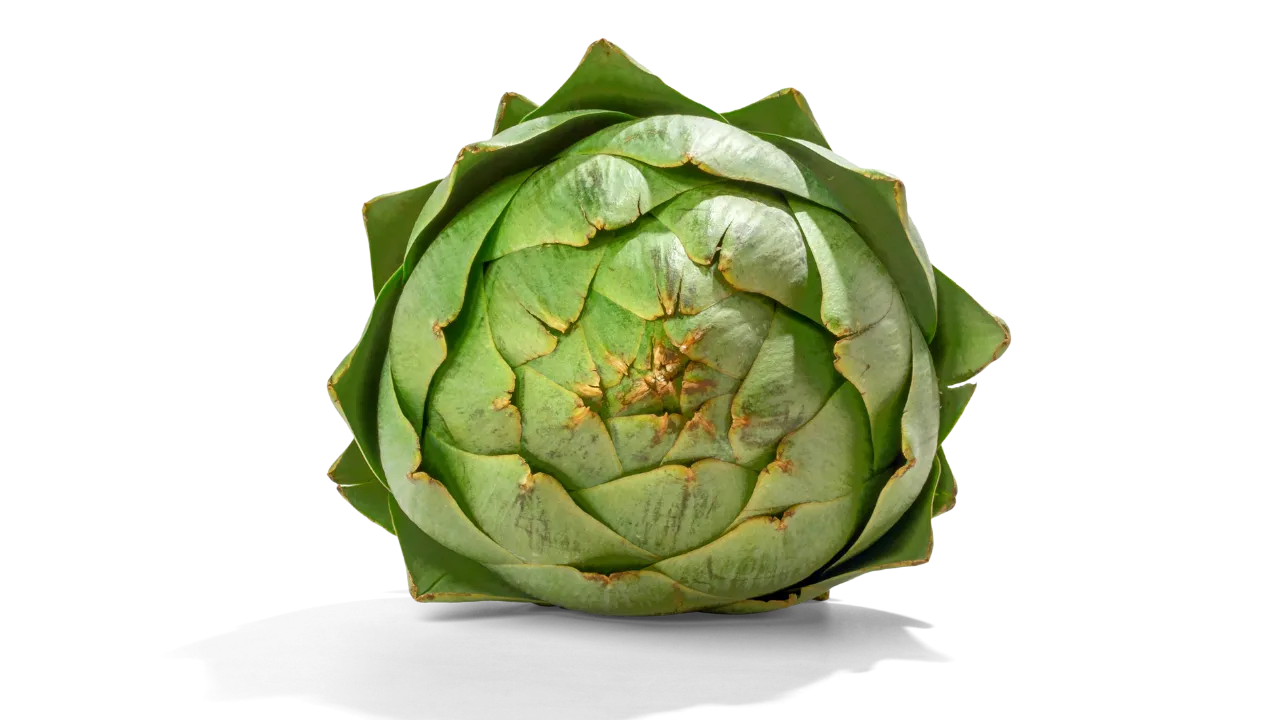 German Shepherd can eat artichoke
German Shepherd can eat artichoke
Furthermore, artichokes are packed with vitamins B6, C, K, folic acid, magnesium, and potassium. These nutrients contribute to healthy nerve and muscle function, a strong immune system, and improved digestion. Additionally, artichokes’ high fiber content can help reduce cholesterol levels and promote beneficial gut bacteria, essential for a healthy digestive tract.
When feeding artichokes, be sure to offer small pieces of cooked artichoke. Raw artichokes contain compounds that may irritate their digestive systems, so cooking them first is highly recommended for your German Shepherd’s comfort and safety.
Here are 7 important vitamins and nutrients for German Shepherds that you can find in artichoke:
- Vitamin B6
- Vitamin C
- Vitamin K
- Folic Acid
- Magnesium
- Potassium
- Dietary Fiber
Acorn Squash
Adding acorn squash to a German Shepherd’s diet can significantly benefit its health and overall well-being. This unique and delicious vegetable is packed with vitamins, minerals, antioxidants, and dietary fiber, all of which are important for maintaining a healthy body and promoting good nutrition.
Acorn squash is also low in calories, making it an ideal choice for dogs trying to maintain or lose weight. It provides a nutritious, filling snack without the extra calories often found in other treats, supporting a balanced diet.
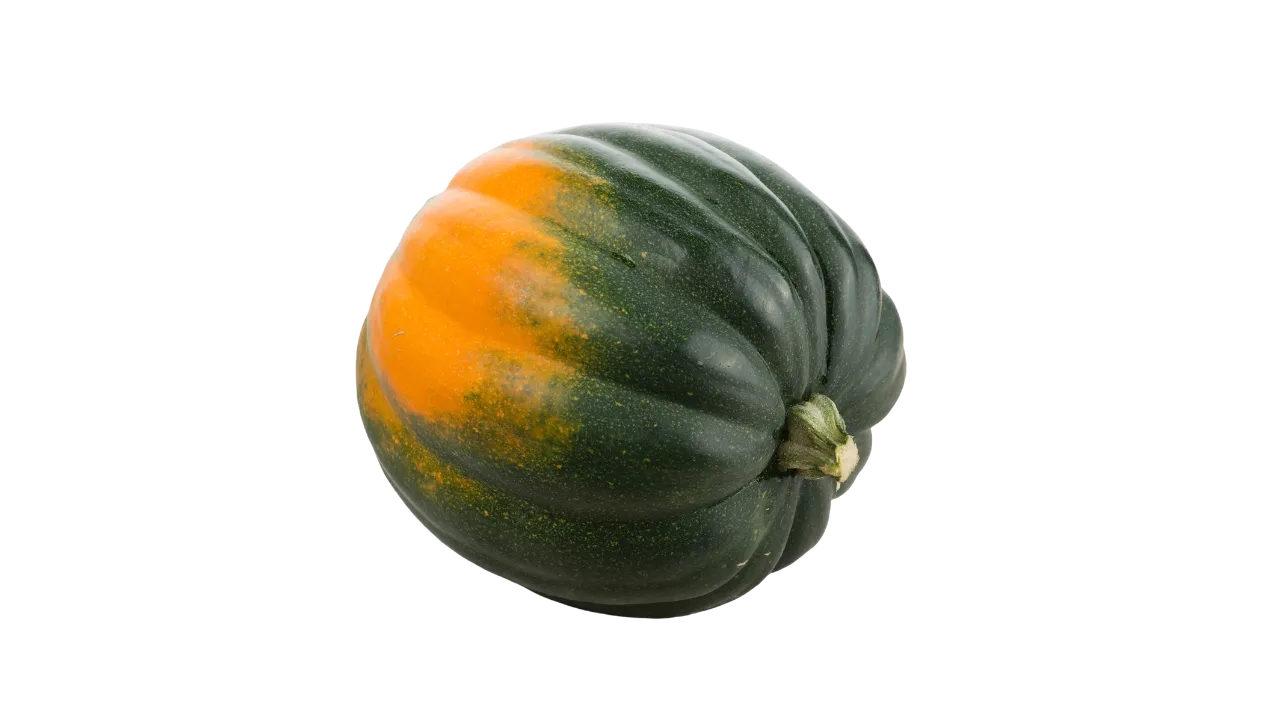 German Shepherd eating acorn squash
German Shepherd eating acorn squash
The high fiber content of acorn squash also helps keep a dog’s digestive system running smoothly and aids in nutrient absorption. The vitamin A found in this veggie can help support ocular health, contributing to good vision. Additionally, the vitamin C found in acorn squash provides antioxidant protection against free-radical damage, enhancing cellular health.
Here are 7 important vitamins and nutrients for German Shepherds that you can find in acorn squash:
- Vitamin A
- Vitamin C
- Dietary Fiber
- Magnesium
- Potassium
- Iron
- Calcium
Asparagus
German Shepherds can eat asparagus because it is rich in vitamins, minerals, and antioxidants. Asparagus is a great source of vitamins A, B6, and C, along with calcium, iron, and dietary fiber. The high levels of antioxidants found in asparagus help boost your dog’s immune system while also providing anti-inflammatory benefits, which can be particularly useful for joint health.
Asparagus also contains enzymes that aid digestion and vitamin K, which helps promote healthier bones, teeth, and vision. Its low-calorie content makes it an ideal treat for dogs watching their weight, offering a nutritious alternative to high-calorie snacks.
When serving asparagus to German Shepherds, cut it into small pieces and cook it until tender. Raw asparagus can be difficult for dogs to digest, so cooking is recommended to prevent stomach upset.
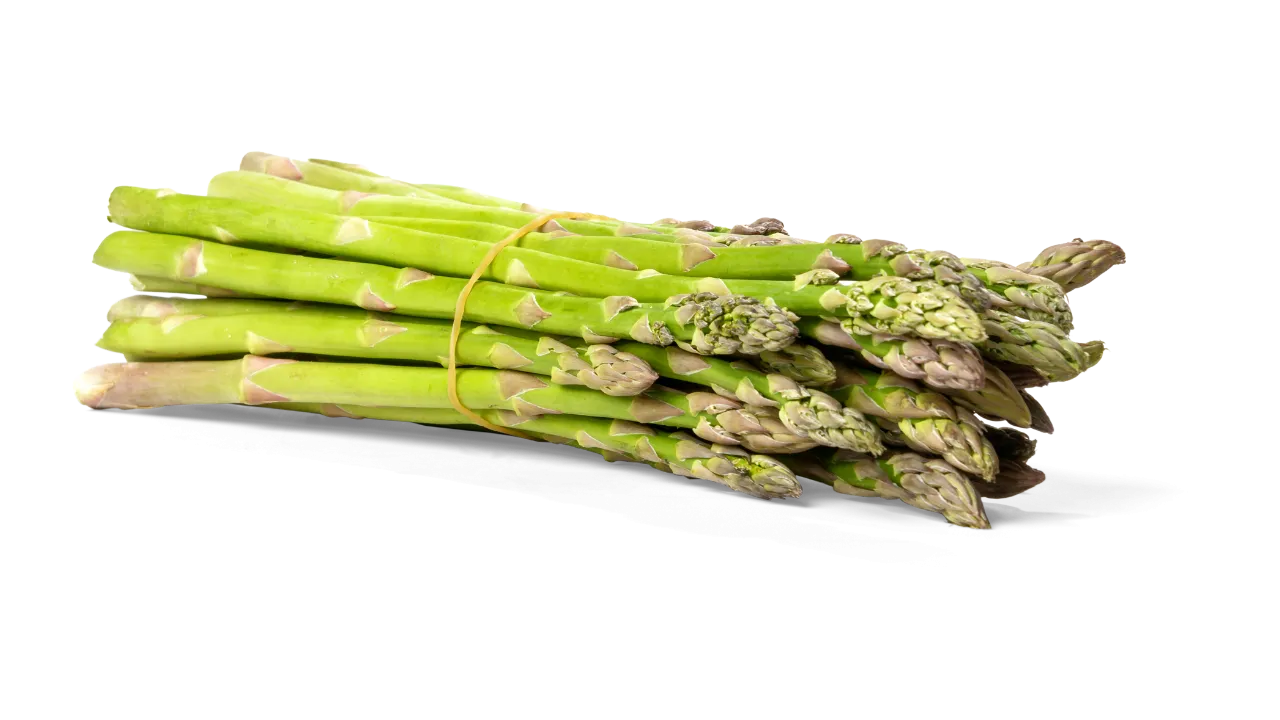 German Shepherd can eat asparagus
German Shepherd can eat asparagus
As with any new food item, start by introducing a few pieces and then gradually increasing the amount over time. Make sure to monitor your German Shepherd for signs of any adverse reactions. If your dog appears uncomfortable or has an upset stomach, discontinue feeding asparagus and consult your veterinarian. This cautious approach ensures the safety and well-being of your pet.
Here are 7 important vitamins and nutrients for German Shepherds that you can find in asparagus:
- Vitamin A
- Vitamin B6
- Vitamin C
- Calcium
- Iron
- Dietary Fiber
- Vitamin K
Beets
German Shepherds can enjoy the many benefits of beets due to their highly nutrient-rich content. Beets are a low-calorie, high-fiber root vegetable packed with essential vitamins and minerals such as vitamin C, folate, and potassium. They are also rich in antioxidants, which can help protect dogs from certain diseases and improve their overall health.
The high fiber content of beets can help promote proper digestion and regular bowel movements in German Shepherds, helping to keep them healthy and happy. Beets are also known for their anti-inflammatory properties, which can help reduce joint pain and stiffness in older dogs and improve overall immunity, contributing to a better quality of life.
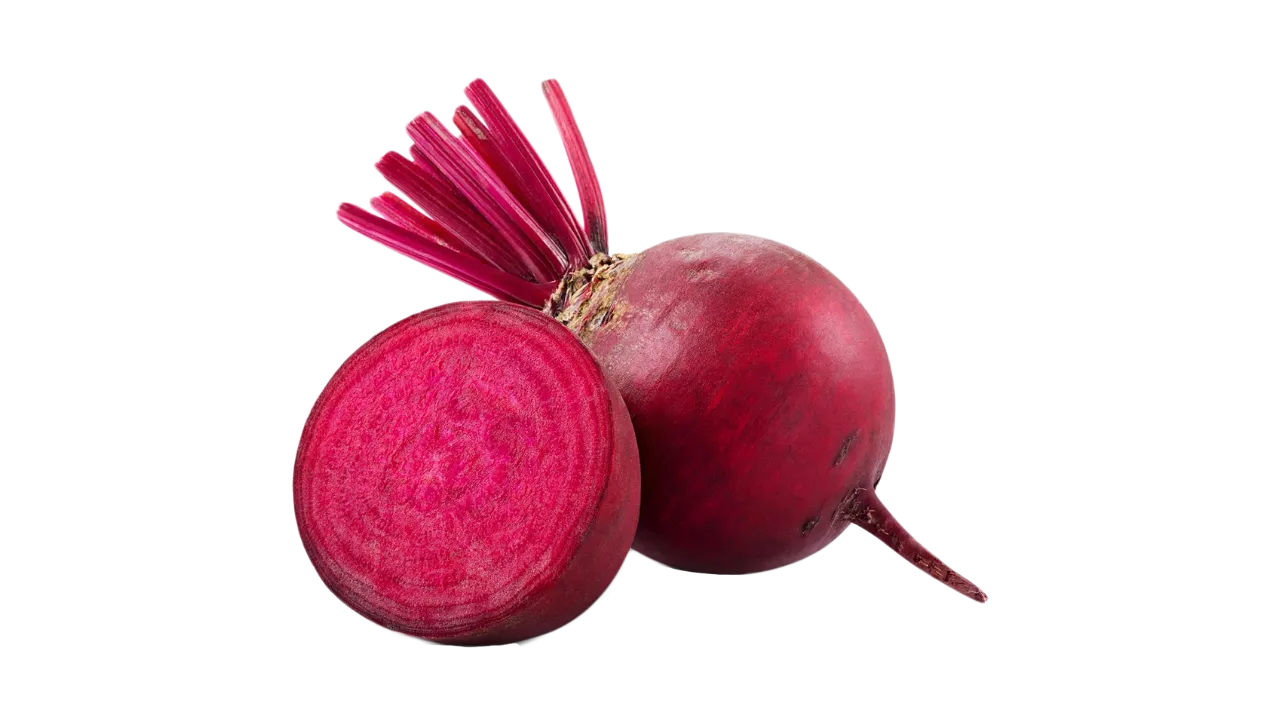 German Shepherd can eat beets
German Shepherd can eat beets
Beets should be served cooked or raw to German Shepherds, but it’s important to ensure they are cut small enough for the dog to chew and digest properly. Always ensure that beets are thoroughly washed before serving them to your pup, as there may be dirt or pesticides on their surface.
When preparing beets for your German Shepherd, it’s always best to keep portions small and give only a few pieces at a time. Too much beet consumption can lead to loose stools or other digestive issues, so always be mindful of how much your pup is eating to prevent gastrointestinal upset.
Here are 7 important vitamins and nutrients for German Shepherds that you can find in beets:
- Vitamin C
- Folate
- Potassium
- Vitamin A
- Vitamin B6
- Iron
- Magnesium
Beet Greens
Adding beet greens to a German Shepherd’s diet is beneficial because they are high in vitamins and minerals like vitamins A, C, magnesium, potassium, and iron. They also contain essential fatty acids that help support the immune system, crucial for fighting off illness.
Beet greens offer dietary fiber, which helps maintain healthy digestion, and amino acids, which help build muscle mass, contributing to a strong and active physique.
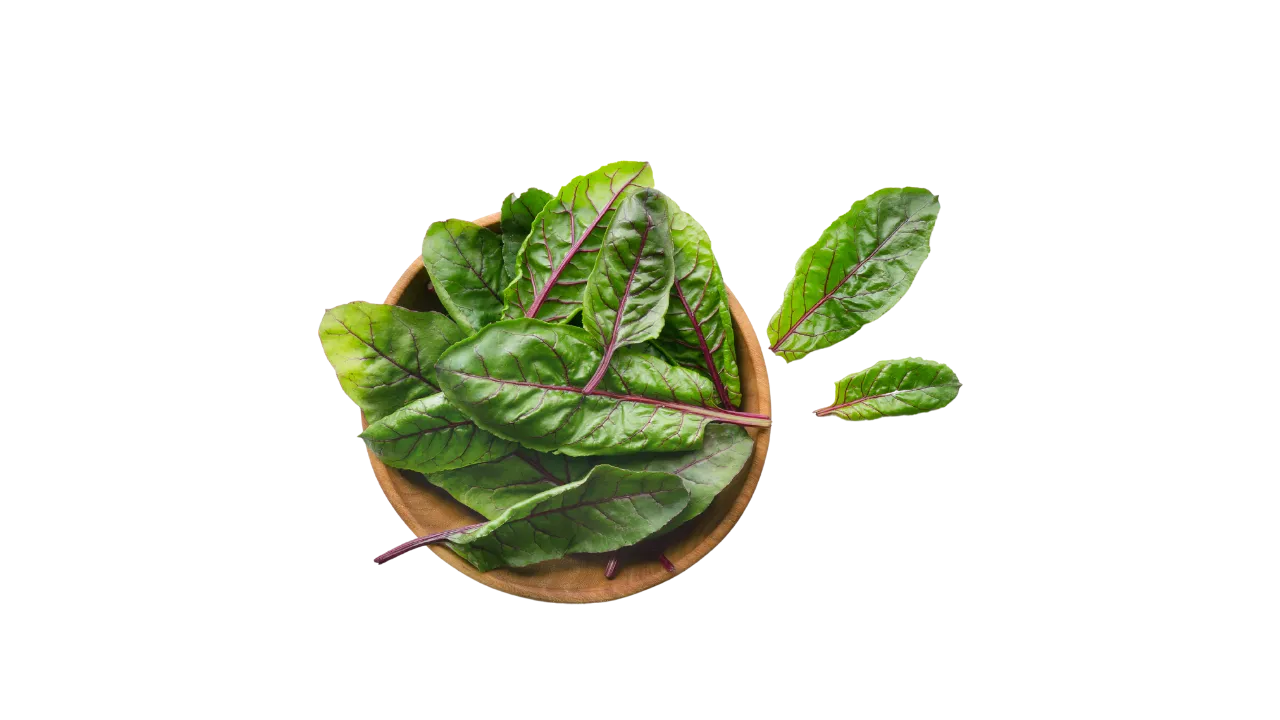 German Shepherd eating beet greens
German Shepherd eating beet greens
Additionally, beet greens contain antioxidants that can help protect cells from damage caused by free radicals, supporting cellular health and longevity.
Here are 7 important vitamins and nutrients for German Shepherds that you can find in beet greens:
- Vitamin A
- Vitamin C
- Magnesium
- Potassium
- Iron
- Essential Fatty Acids
- Antioxidants
Broccoli
German Shepherds should eat broccoli for a variety of reasons. It is a highly nutritious vegetable packed with vitamins, minerals, and fiber to help keep your pet healthy and fit. Broccoli is low in calories and fat but high in essential vitamins like A, B, C, K, and E, offering a broad spectrum of nutritional support.
This cruciferous vegetable also contains numerous antioxidants, which can help reduce inflammation, protect against cancer and heart disease, and even boost the immune system, enhancing overall resilience. Broccoli also contains a good amount of calcium and magnesium, both important minerals for bone health and muscle function.
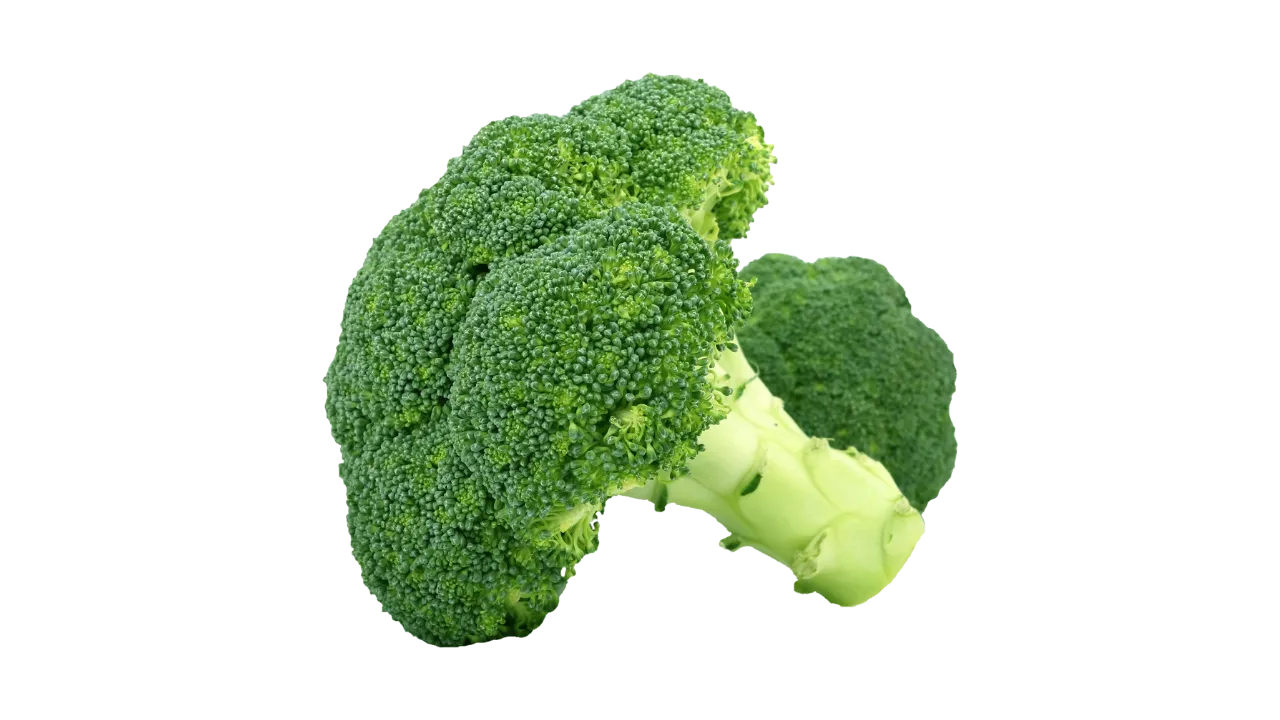 German Shepherd can eat broccoli
German Shepherd can eat broccoli
As with all vegetables, it’s best to feed your German Shepherd cooked broccoli, as the cooked version is safer and easier to digest than raw broccoli. You can also add small amounts of steamed broccoli to your dog’s diet, but it should be cooked thoroughly before feeding, as raw broccoli can be difficult to digest and cause gas.
Here are 7 important vitamins and nutrients for German Shepherds that you can find in broccoli:
- Vitamin A
- Vitamin B
- Vitamin C
- Vitamin K
- Vitamin E
- Calcium
- Magnesium
Brussels Sprouts
Brussels Sprouts can be a great addition to a German Shepherd’s diet, as they are packed with important vitamins and minerals that can have numerous health benefits. High in antioxidants, including vitamin A, vitamin C, and many of the B vitamins, Brussels sprouts are also a great source of fiber, which can help regulate digestion.
Brussels Sprouts are a good source of iron, magnesium, potassium, and phosphorus. Iron helps to regulate metabolism and energy levels, while magnesium is important for healthy nerve and muscle functioning. Potassium supports normal heart function, while phosphorus can aid in healthy growth and development, especially in younger dogs.
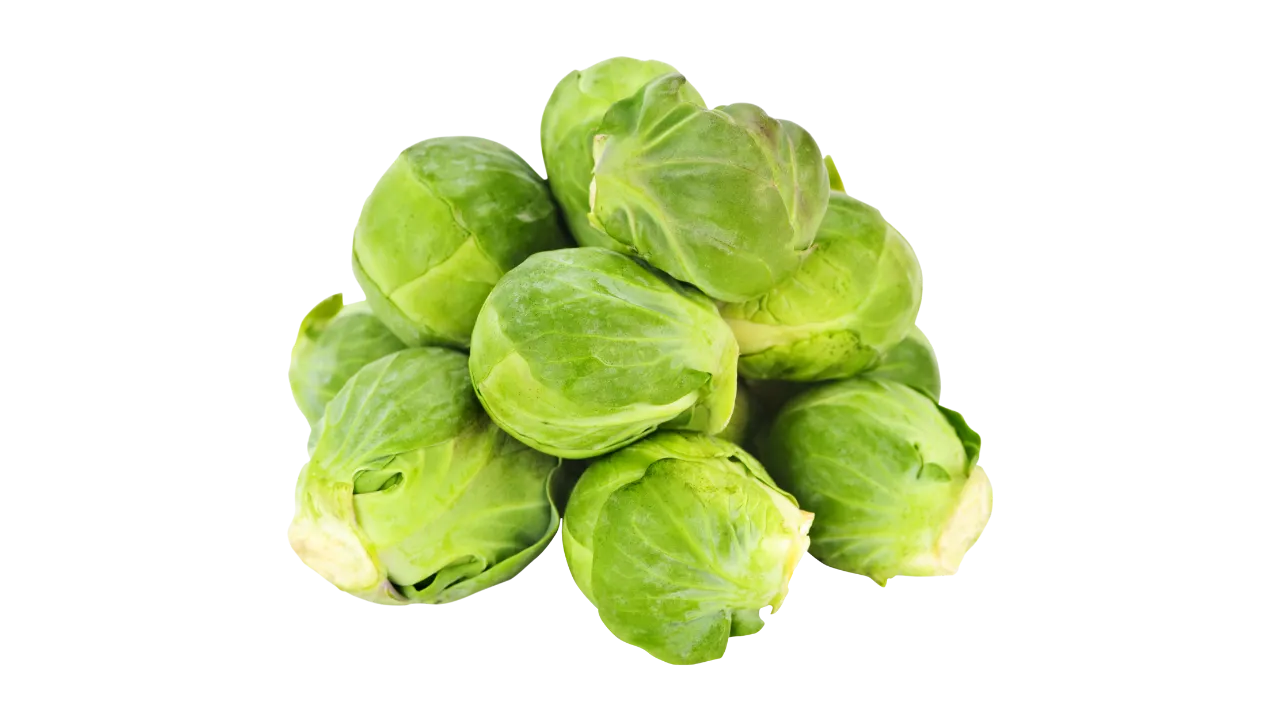 German Shepherd can eat Brussels sprouts
German Shepherd can eat Brussels sprouts
Brussels Sprouts should be cooked until tender but not too soft for a German Shepherd’s diet. This is because the nutrients in Brussels Sprouts are more easily absorbed when cooked for a shorter amount of time. Boiling or steaming is preferable to frying, as this will help preserve the nutritional content.
To get the most out of Brussels sprouts in a German Shepherd’s diet, serve them alongside other foods high in fiber and antioxidants, such as whole grains and fruits. They can also be mixed with ground beef or turkey for a complete meal. As with any food, moderation is key to a healthy diet for your German Shepherd, ensuring a balanced intake.
Here are 7 important vitamins and nutrients for German Shepherds that you can find in Brussels sprouts:
- Vitamin A
- Vitamin C
- B Vitamins
- Iron
- Magnesium
- Potassium
- Phosphorus
Butternut Squash
Butternut squash is a nutrient-rich, low-calorie vegetable that can benefit German Shepherds’ diets in many ways. It is an excellent source of dietary fiber and complex carbohydrates, which help support healthy digestion and regular bowel movements, preventing issues like constipation.
Besides, it contains vitamins and minerals such as A, B6, C, E, and K. It also contains folate, potassium, manganese, magnesium, zinc, iron, and phosphorus, providing a comprehensive nutrient profile.
Butternut squash can be a great addition to your dog’s diet as it is low in fat and high in antioxidants, which can help fight off free radicals that cause cell damage, supporting cellular health.
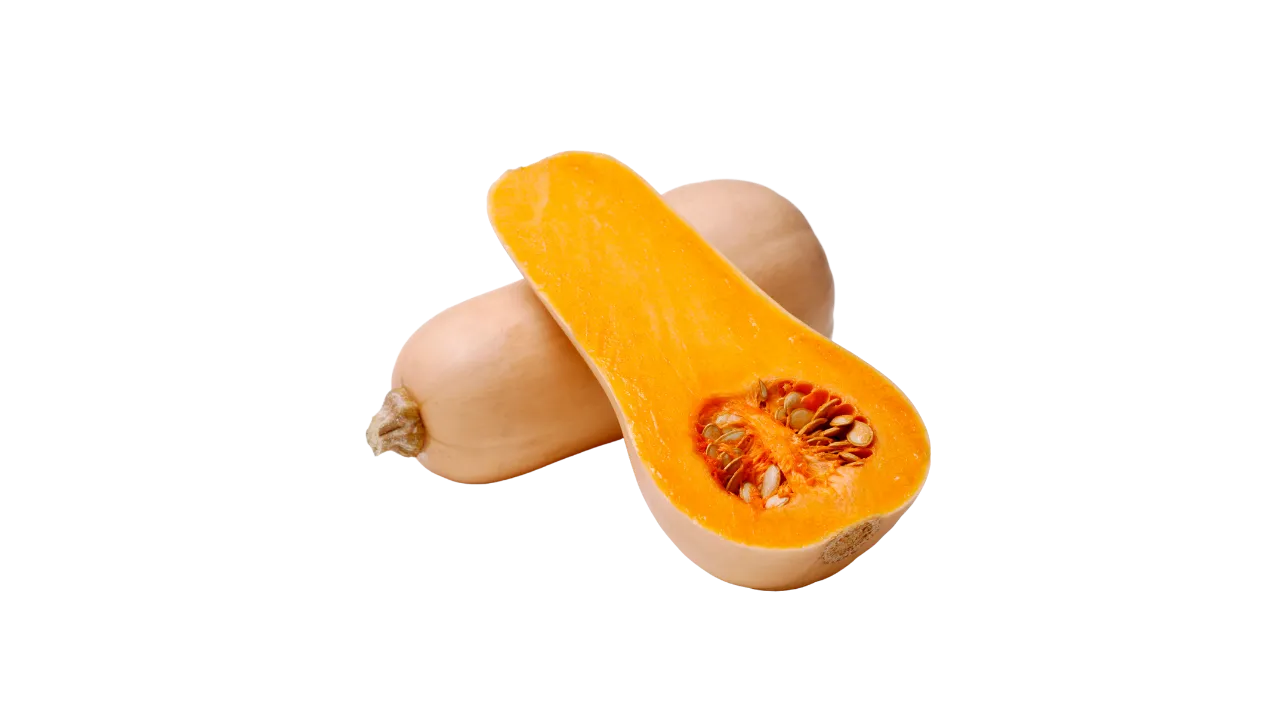 German Shepherd eating butternut squash
German Shepherd eating butternut squash
There are several ways to serve butternut squash to your German Shepherd dog. One way is to cut it into small cubes and add it raw to their regular meals. Alternatively, you can boil or steam the squash before adding it, making it easier to digest. You can also cook and mash the squash into a puree and mix it with their food or use it as an ingredient in homemade dog treats.
Whichever way you serve butternut squash to your German Shepherd, be sure to do so in moderation. Too much of this vegetable can cause digestive upset and diarrhea. It is also important to ensure that the squash is served as fresh as possible, as it can spoil quickly, potentially causing health issues.
Here are 7 important vitamins and nutrients for German Shepherds that you can find in butternut squash:
- Vitamin A
- Vitamin B6
- Vitamin C
- Vitamin E
- Vitamin K
- Folate
- Potassium
Cabbage
Cabbage is an incredibly nutritious vegetable packed with essential vitamins and minerals, making it a great inclusion in any German Shepherd’s diet. It’s an excellent source of vitamins and minerals, such as vitamin C, potassium, calcium, manganese, magnesium, and dietary fiber, contributing to overall well-being.
This cruciferous vegetable also contains powerful antioxidant compounds and is low in calories. Cabbage may help support overall health, reduce inflammation, and even protect against certain chronic diseases. It also has anti-cancer properties and can help strengthen a German Shepherd’s immune system, offering significant health advantages.
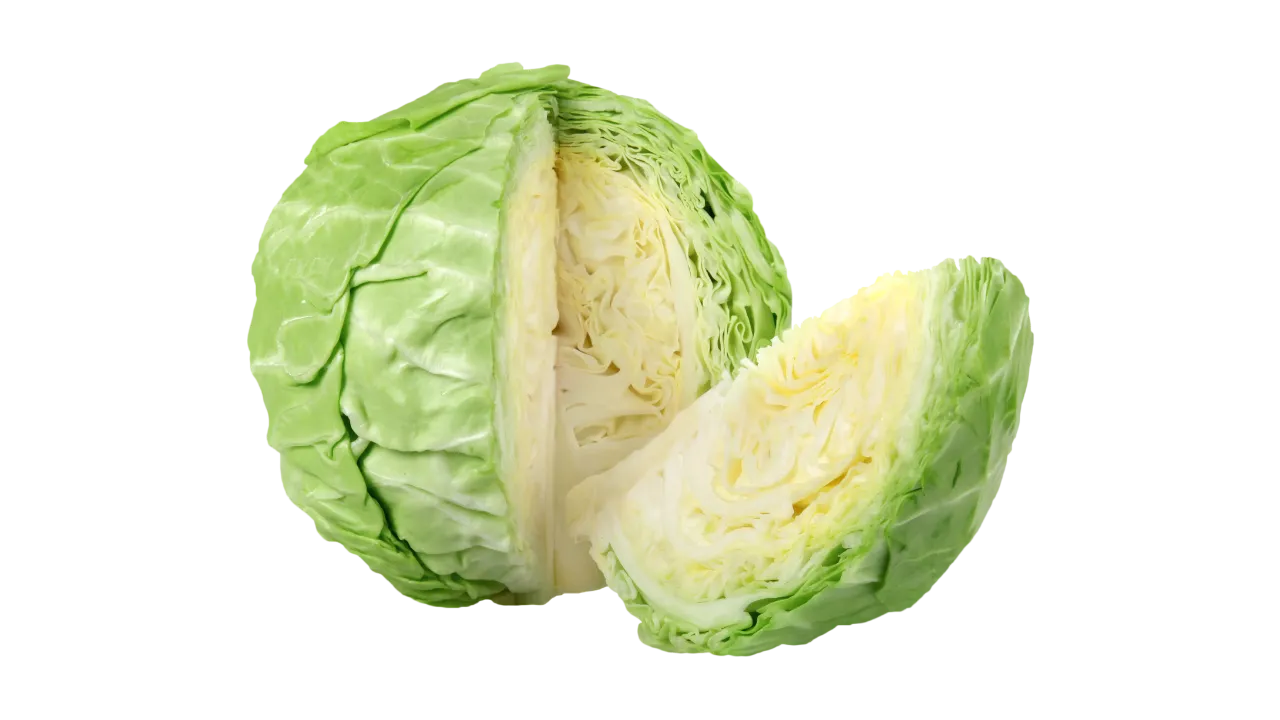 German Shepherd can eat cabbage
German Shepherd can eat cabbage
You should include cabbage as part of your German Shepherd’s weekly meal rotation for an optimal diet. When feeding your dog cabbage, you can steam it for a few minutes to make it softer or serve it raw as part of a fresh vegetable salad. Either way, your German Shepherd will benefit from the nutritional advantages of this superfood!
Here are 7 important vitamins and nutrients for German Shepherds that you can find in cabbage:
- Vitamin C
- Potassium
- Calcium
- Manganese
- Magnesium
- Dietary Fiber
- Antioxidant Compounds
Chard (Swiss Chard)
Adding chard (Swiss Chard) to a German Shepherd’s diet is an excellent choice, as it provides several important health benefits. Chard contains essential vitamins and minerals, such as vitamins A, C, E, K, and magnesium. These vitamins and minerals can help maintain good overall health in dogs.
This vegetable is also full of fiber, which helps with digestion and can even help reduce the risk of some intestinal diseases. Chard is also rich in antioxidants, which may help protect against some forms of cancer, offering a preventative benefit.
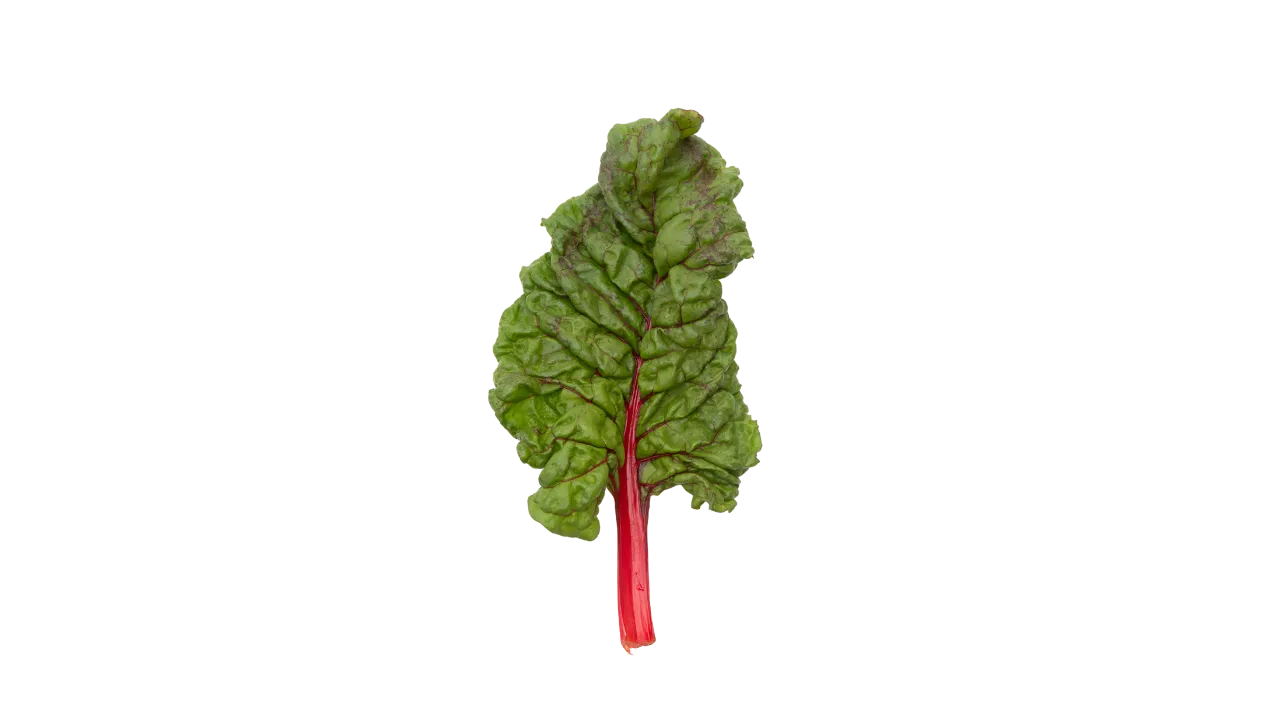 German Shepherd can eat Swiss Chard
German Shepherd can eat Swiss Chard
Furthermore, chard is a great source of iron, which helps keep German Shepherds strong and healthy. Iron is important for transporting oxygen throughout the body and supports a healthy immune system. Additionally, chard is a great source of beta-carotene, an important antioxidant that helps protect cells from damage caused by free radicals, contributing to cellular longevity.
Here are 7 important vitamins and nutrients for German Shepherds that you can find in chard:
- Vitamin A
- Vitamin C
- Vitamin E
- Vitamin K
- Magnesium
- Iron
- Beta-Carotene
Collard Greens
Enhancing a German Shepherd’s diet with collard greens is a wonderful way to ensure their nutritional needs are met and improve their overall health. Collard greens are rich in vitamins, minerals, and dietary fiber, which can help support the digestive system and keep the body functioning properly.
They are also low in calories and fat but high in antioxidants, making them an ideal addition to any canine diet. When feeding collard greens, it is important to cook them thoroughly and serve in moderation, as they can cause gas and bloating if over-consumed.
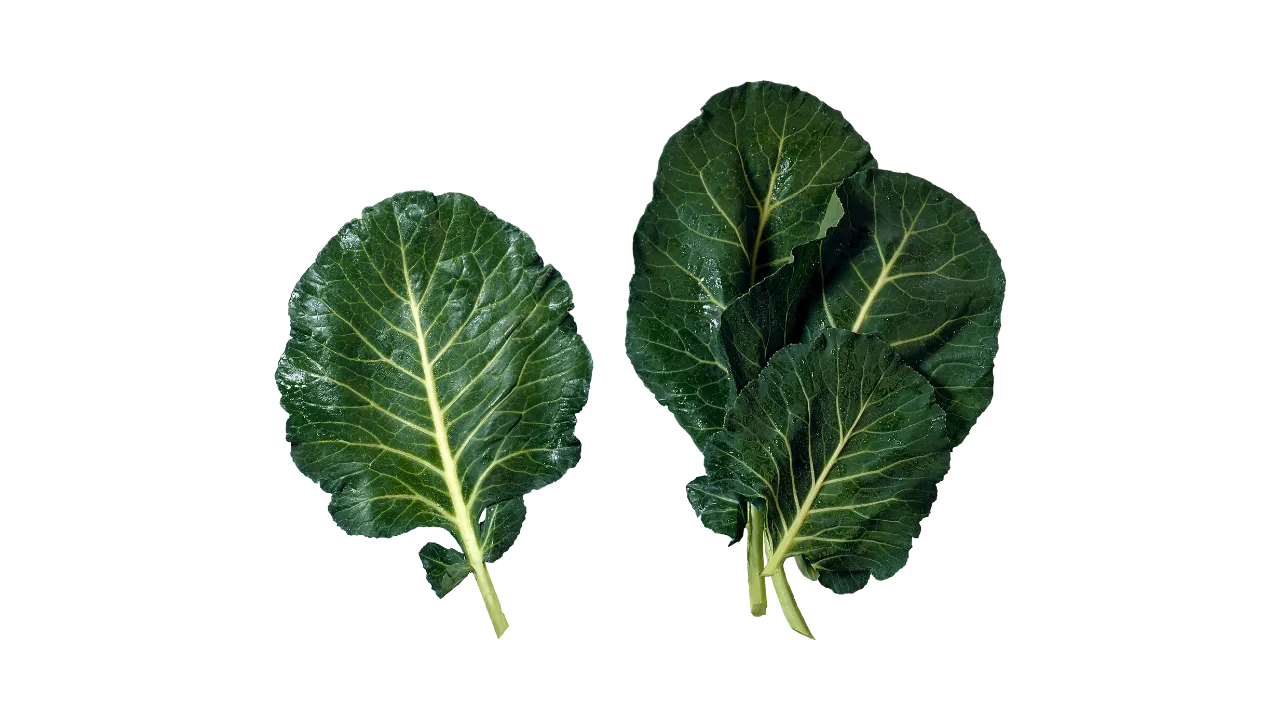 German Shepherd eating collard greens
German Shepherd eating collard greens
Collard greens are an excellent addition to the German Shepherd’s diet because of their superb nutritional value and low-calorie count. They can help provide essential vitamins, minerals, fiber, and other beneficial compounds, supporting a holistic approach to their nutrition. Further, their antioxidant content can help protect against free radical damage and reduce the risk of certain diseases.
Here are 7 important vitamins and nutrients for German Shepherds that you can find in collard greens:
- Vitamin A
- Vitamin C
- Calcium
- Iron
- Magnesium
- Potassium
- Dietary Fiber
Carrot
Carrots are incredibly healthy food for German Shepherds and provide a wide range of benefits to their diets. They are rich in vitamins, minerals, and dietary fiber, making them a great source of nutritional supplementation for a balanced diet. Carrots contain beta-carotene, which is an antioxidant that helps protect cell structure from damage caused by oxidation.
This can help protect against certain types of cancer and possibly delay the signs of aging. They are also low in calories and fat, making them a great treat for dogs who need to watch their weight. Carrots provide German Shepherds with essential minerals such as potassium, magnesium, phosphorus, and calcium.
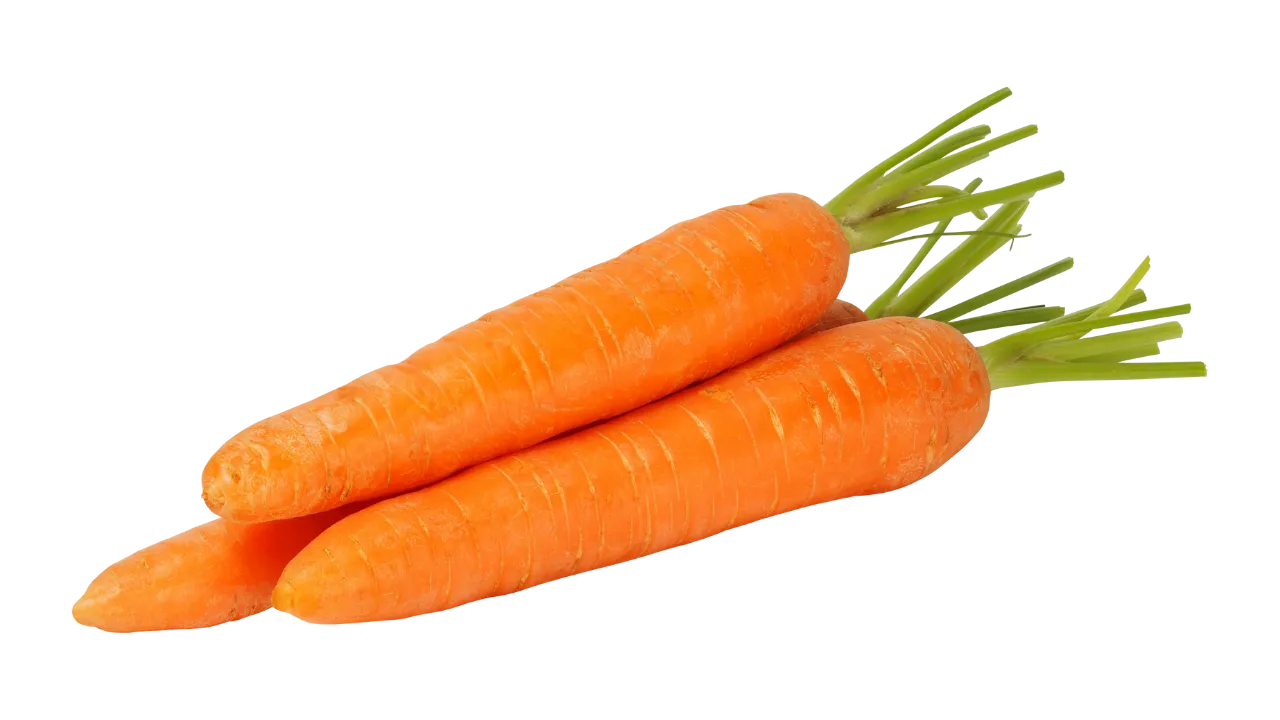 German Shepherd eating carrot
German Shepherd eating carrot
Potassium helps maintain healthy blood pressure levels, while magnesium is important for optimal nerve and muscle function. Calcium helps promote healthy bones, and phosphorus is necessary for metabolizing carbohydrates and fats. Carrots also provide Vitamin A, which helps maintain eye health and a strong immune system.
In addition to the health benefits of carrots, German Shepherds can benefit from their crunchy texture as it helps promote healthy teeth and gums, acting as a natural dental aid. Carrots are also a great way to add variety to your dog’s diet. You can give them raw, grated, or diced carrots as treats or feed them cooked with their regular meals.
Here are 7 important vitamins and nutrients for German Shepherds that you can find in carrots:
- Vitamin A
- Beta-carotene
- Potassium
- Magnesium
- Phosphorus
- Calcium
- Fiber
Cauliflower
Cauliflower is an excellent addition to a German Shepherd’s diet, as it contains multiple beneficial nutrients and vitamins. It’s rich in vitamins C and K, both essential for the proper functioning of an animal’s body. Vitamin C boosts the immune system and helps keep skin and coat healthy. Vitamin K helps maintain strong bones, nerve function, and blood clotting.
Cauliflower is also a great source of dietary fiber, which helps promote regular digestion and prevents constipation in dogs.
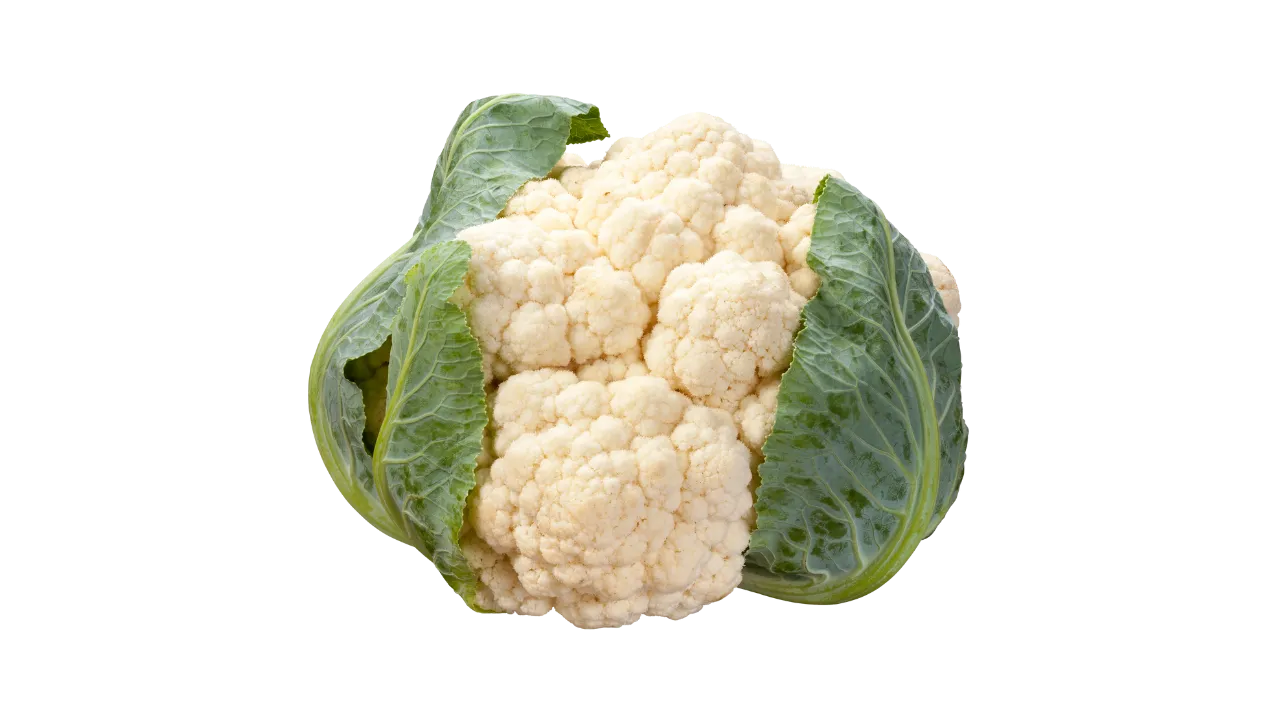 German Shepherd can eat cauliflower
German Shepherd can eat cauliflower
Additionally, it’s low in calories and fat, making it an ideal snack for overweight or obese dogs. It can even be used to replace higher-calorie treats like cheese or bacon, supporting weight management.
Serving cauliflower to dogs is relatively easy due to its mild flavor and soft texture. One way to serve it is by steaming it for 10 minutes. This helps retain its nutrient profile and makes it more digestible for the dog. If you prefer a raw diet, you can simply chop or grate the cauliflower and add it to your dog’s meals.
Here are 7 important vitamins and nutrients for German Shepherds that you can find in cauliflower:
- Vitamin C
- Vitamin K
- Vitamin A
- Potassium
- Magnesium
- Phosphorus
- Folate
Celery
Celery is an excellent addition to a German Shepherd’s diet, providing numerous health benefits. Celery contains various vitamins and minerals to help keep your pup healthy and happy. Among the most important are Vitamin A, which helps with vision and the immune system, Vitamin K, which helps with blood clotting, and Vitamin C, which helps with tissue repair and collagen production.
Celery also contains antioxidants, dietary fiber, and potassium, which are important for a pup’s overall health. When fed in moderation as part of a balanced diet, celery can improve digestion, aid in weight management, and even help to reduce bad breath, making it a multifaceted beneficial treat.
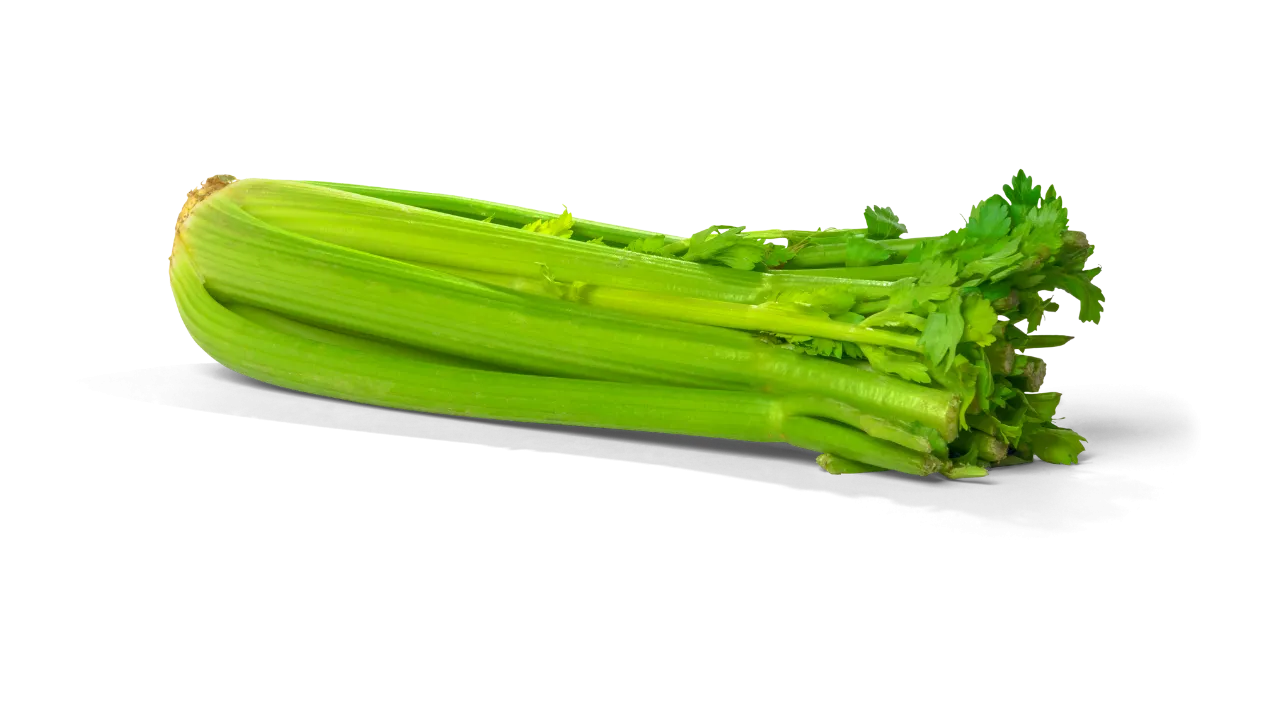 German Shepherd eating celery
German Shepherd eating celery
Lastly, the crunchy texture of celery is great for cleaning your pup’s teeth and can help prevent tartar buildup, contributing to better dental hygiene. Feeding your German Shepherd celery as part of their diet will keep them healthy and looking their best!
Here are 7 important vitamins and nutrients for German Shepherds that you can find in celery:
- Vitamin A
- Vitamin K
- Vitamin C
- Antioxidants
- Dietary Fiber
- Potassium
- Calcium
Sweet Corn
Sweet corn can be an excellent addition to a German Shepherd’s diet. It contains essential nutrients like fiber, Vitamin B6, and antioxidants. Not only is it a great source of energy for active dogs, but it also provides some essential fatty acids that are necessary for healthy skin and coat, promoting a shiny appearance.
The high-fiber content of sweet corn aids in digestion and can help alleviate digestive issues like constipation. The nutrients in sweet corn can also support a healthy immune system, as well as give your pup an overall boost of energy. Plus, it’s great for weight management because it’s low in calories but high in fiber and protein.
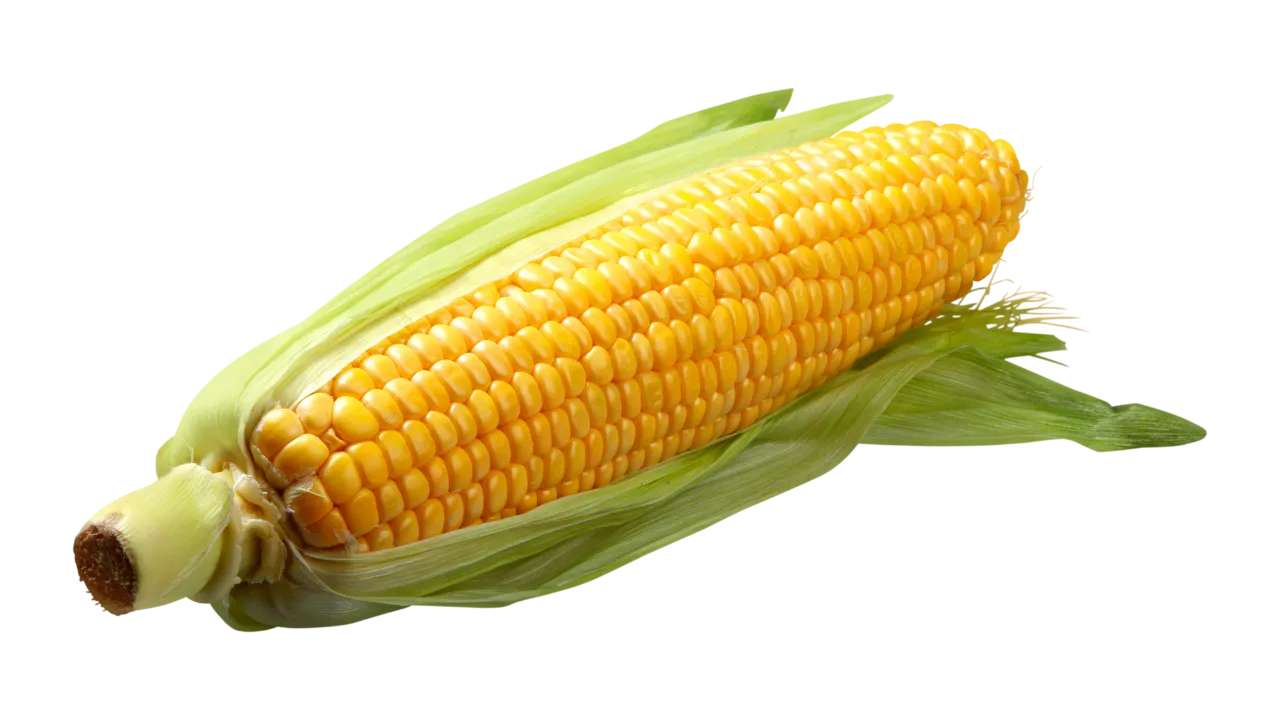 German Shepherd can eat corn
German Shepherd can eat corn
When you feed your dog sweet corn, cook it first. Otherwise, it can be hard to digest and cause an upset stomach. Besides, sweet corn should only make up a small portion of their diet and not replace any other healthy foods, maintaining a balanced nutritional intake.
Here are 7 important vitamins and nutrients for German Shepherds that you can find in sweet corn:
- Vitamin B6
- Fiber
- Thiamine
- Folate
- Niacin
- Magnesium
- Phosphorus
Endive
Endive is a great addition to any German Shepherd’s diet, as it is packed with essential vitamins and minerals that can help keep your pooch healthy. Endive is high in fiber, which helps support a healthy digestive system, as well as aiding in preventing constipation. It is also rich in Vitamins A and K, essential for a pup’s growth and development.
Furthermore, endive is also known to contain anti-inflammatory properties that can help reduce joint pain and stiffness in dogs, particularly beneficial for older German Shepherds. Plus, it is low in calories and fat, making it an excellent choice for weight-conscious pups.
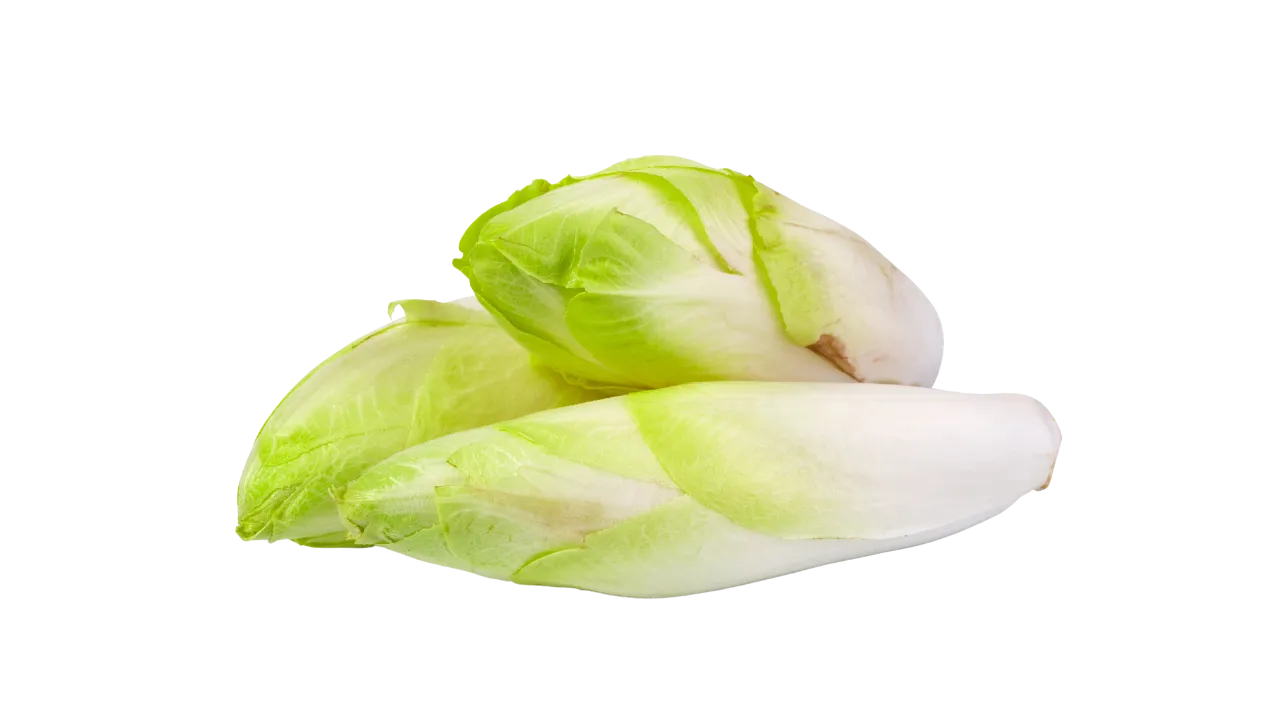 German Shepherd eating endive
German Shepherd eating endive
Endive makes a great snack or side dish for your canine companion, as it is easy to cook and goes well with other ingredients. You can add it to your dog’s meals as a crunchy topping or enjoy it as a standalone dish alongside lean protein sources such as fish or chicken. Whichever way you serve up endive, your pup will love the scrumptious flavor!
Here are 7 important vitamins and nutrients for German Shepherds that you can find in endive:
- Vitamin A
- Vitamin K
- Vitamin C
- Folate
- Beta-carotene
- Calcium
- Iron
Green Bell Peppers
Green bell peppers are an excellent addition to a German Shepherd’s diet and offer several key health benefits. Rich in antioxidants, vitamins, and minerals, green bell peppers provide dogs with a healthy dose of dietary fiber that can aid digestion and help regulate blood sugar levels.
Studies have shown that green bell peppers can lower inflammation in the body, improving overall health. Their high levels of dietary fiber also make them an excellent addition to a dog’s diet, aiding digestion and helping to prevent constipation.
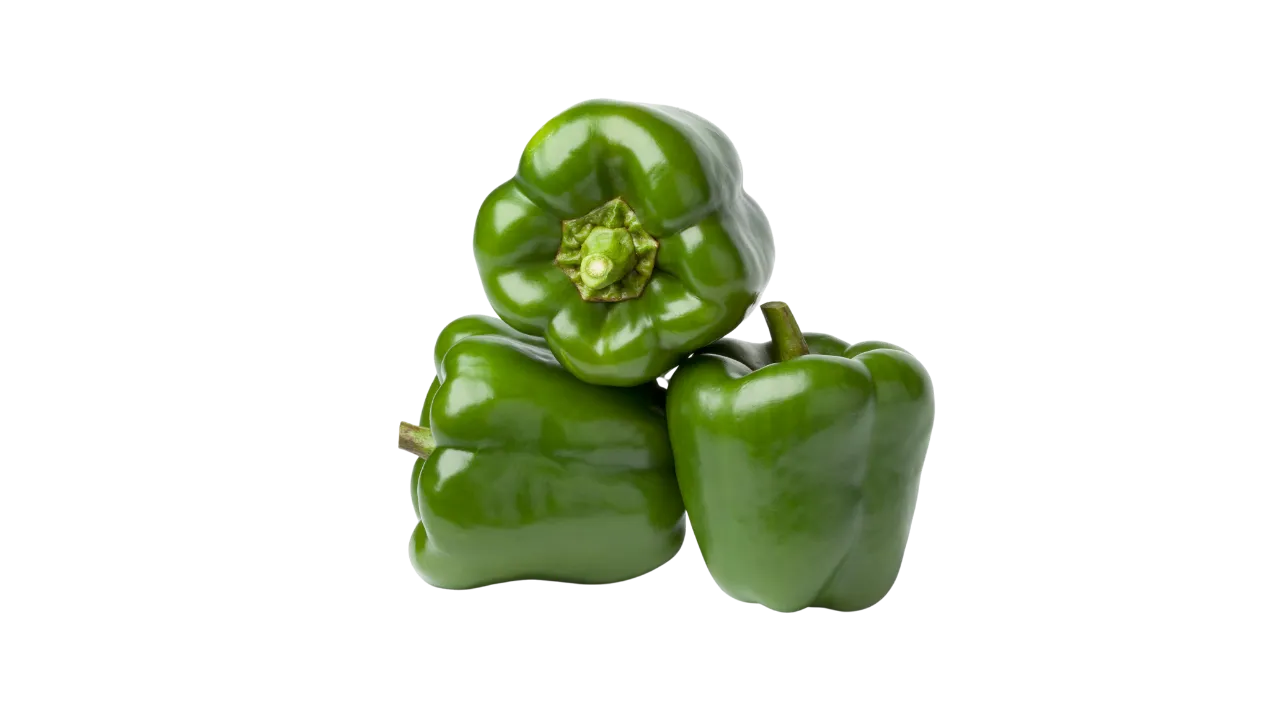 German Shepherd eating green bell peppers
German Shepherd eating green bell peppers
In addition to their powerful nutritional benefits, green bell peppers are low in calories and fat, making them a great treat for dogs who need to maintain a healthy weight. They can be served raw or cooked and can be added to a variety of dishes, adding flavor and nutrients.
Green bell peppers are safe for dogs, though some canines may experience mild digestive upset if they consume too much. It’s important to introduce green bell peppers into your GSD’s diet in moderation, as overconsumption can lead to gastric distress.
Here are 7 important vitamins and nutrients for German Shepherds that you can find in green bell peppers:
- Vitamin A
- Vitamin B6
- Vitamin C
- Vitamin E
- Folate (Vitamin B9)
- Potassium
- Magnesium
Kale
Adding kale to a German Shepherd’s diet can benefit their overall health and well-being. Kale is a nutrient-rich superfood that contains vitamins A, C, and K, as well as minerals like calcium and iron. It is low in carbohydrates and calories, making it a great addition to any dog’s diet.
Kale is an excellent source of dietary fiber. Dietary fiber helps to keep the GSD’s digestive system working properly and can help reduce constipation. Adding kale to a German Shepherd’s meals can also help them feel fuller for longer periods, which may be beneficial if they tend to eat too quickly, assisting with weight management.
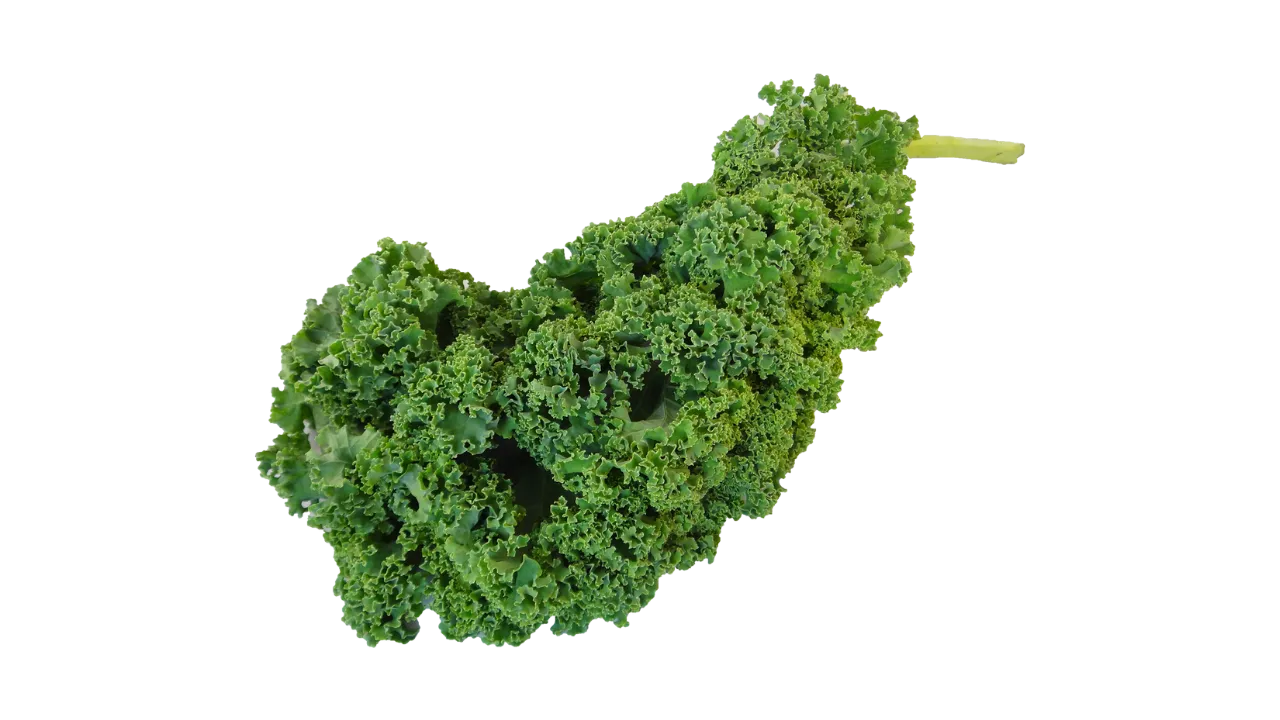 German Shepherd eating kale
German Shepherd eating kale
Kale is also a great source of antioxidants, which can help protect the German Shepherd’s cells from damage. This can be especially beneficial for older GSDs who may have compromised immune systems due to age-related conditions, providing an extra layer of protection.
Kale is an easy vegetable to add to your German Shepherd’s diet. It can be served raw or cooked and can be added to many meals as a nutritious and tasty addition. Kale can also be mashed or pureed to make a delicious treat for your pup.
Here are 7 important vitamins and nutrients for German Shepherds that you can find in kale:
- Vitamin A
- Vitamin C
- Vitamin K
- Calcium
- Iron
- Folate (Vitamin B9)
- Beta Carotene
Kohlrabi
Kohlrabi is a cruciferous vegetable that can benefit German Shepherds’ diets. It contains essential vitamins and minerals, including Vitamin C, B6, potassium, and dietary fiber. The high amount of vitamin C helps to boost the immune system of dogs, while vitamin B6 plays a role in metabolism and helps to reduce inflammation.
The dietary fiber helps to support digestive health and keeps pets full for longer, which can aid in weight management. Kohlrabi can be served raw or cooked; however, it is best to avoid over-cooking so that the nutritional benefits remain intact.
To feed kohlrabi to your dog, chop it into small pieces and serve it as part of their regular dish, ensuring it’s easily digestible.
Here are 7 important vitamins and nutrients for German Shepherds that you can find in kohlrabi:
- Vitamin C
- Vitamin B6
- Potassium
- Dietary Fiber
- Folate
- Magnesium
- Phosphorous
Eggplant
German Shepherds can benefit from adding eggplant to their diet in various ways. First, it is a low-calorie vegetable, providing a great source of fiber and essential vitamins and minerals necessary for proper health and well-being. Moreover, eggplants’ high water content helps keep GSDs hydrated and maintain a healthy body temperature.
Eggplant is also packed with antioxidants, helping to prevent cell damage and keep a dog’s immune system strong. Additionally, eggplants are an excellent source of manganese, which can help improve overall joint health, increasing mobility in dogs with arthritis or other joint issues, making it particularly beneficial for aging dogs.
Finally, the magnesium found in eggplants helps to reduce inflammation and improve overall digestion in German Shepherds. German Shepherds can enjoy all its benefits by including eggplant as part of a well-rounded diet, ensuring a diverse and nutrient-rich intake.
Here are 7 important vitamins and nutrients for German Shepherds that you can find in eggplant:
- Vitamin C
- Vitamin B6
- Vitamin K
- Potassium
- Manganese
- Magnesium
- Iron
Green Beans
Green beans can be a potentially beneficial addition to a German Shepherd’s diet, providing many nutritional benefits and helping ensure our canine companions’ overall health and wellness. Green beans are an excellent source of dietary fiber, vitamins, minerals, and antioxidants, contributing to a robust immune system.
Fiber helps a dog’s digestive system function properly by aiding digestion and preventing constipation. The vitamins and minerals green beans contain can help support a healthy immune system, strong bones, and even healthy skin. Antioxidants in green beans also reduce inflammation throughout the body by neutralizing free radicals, which can mitigate the risk of various diseases.
In addition to their health benefits, green beans are also low in calories and fat. This makes them an excellent source of nutrition for overweight or obese dogs, as they can help to satisfy hunger without adding extra calories, supporting effective weight management.
Green beans should always be cooked before feeding them to your German Shepherd. They should not be given raw, as this could cause digestive upset and other issues. Boiled green beans are generally the best option for dogs, but steamed green beans are also an acceptable alternative. Green beans should not be seasoned with additives and should be served to your dog without salt or other seasonings.
Here are 7 important vitamins and nutrients for German Shepherds that you can find in green beans:
- Vitamin C
- Vitamin K
- Vitamin A
- Folate
- Manganese
- Iron
- Magnesium
Red Bell Peppers
Red bell peppers are a nutritious and beneficial food for your German Shepherd, offering many health advantages. These sweet, succulent vegetables are packed full of essential vitamins and minerals that dogs need for a healthy life. Red bell peppers are an excellent source of Vitamin A, which is important for maintaining healthy eyesight in dogs.
They are also high in Vitamin C, which supports a strong immune system and helps prevent sickness. In addition to vitamins, red bell peppers contain dietary fiber, which aids digestion and contributes to optimal gut health, promoting a well-functioning digestive system.
